Casa
34 Months To 6 Years OldThe Casa program at My First Montessori School revolves around building and strengthening the foundations learned by the students in the Toddler program. They are encouraged to be independent learners and get a strong grasp of educational materials at their own pace and ability. We maintain a 8:1 student to teacher ratio, while each Casa classroom has Montessori trained teachers and Registered Early Childhood Educators.
What your child will learn
My First Montessori School’s unique Casa program uses the Montessori philosophy along with the Ministry of Education pedagogy on early learning to help children achieve their fullest potential. Please click below to find out more about the domains and skills that the children will work towards.
Emotional
- Self-concept
- Identity formation
- Self-esteem
- Recognizing and expressing emotions
- Positive attitudes toward learning
Social
- Making friends
- Conflict resolution
- Peer group entry skills
- Helping skills
- Co-operation
- Empathy
- Interacting with adults
Language & Literacy
- Using verbal & non-verbal communication
- Vocabulary
- Conversing with peers and adults
- Using descriptive language to explain, explore and extend
- Listening to others
- Enjoying literacy
- Phonological awareness
- Reading
- Familiar conventions of print
- Writing skills
Cognition
- Self-regulation
- Problem solving
- Representation
- Questioning
- Observing
- Collecting and organizing information
- Reflecting and reaching conclusions
- Classifying
- Seriating
- Determining quantity
- Identifying patterns
- Measurement
Physical
Gross Motor
- Walking
- Jumping
- Hopping
- Galloping
- Throwing
- Riding
Fine Motor
- Dressing
- Eating
- Tool use
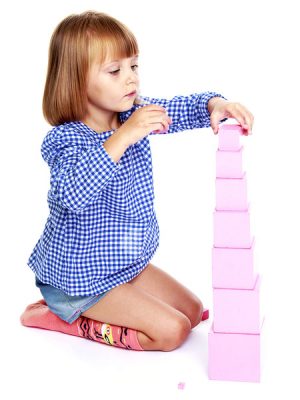
Casa Curriculum
Children enrolled in the Casa program have the potential and opportunity to work on diverse materials. Our classroom is warm and welcoming, encouraging children to feel supported and enjoy their time at our school. The Montessori style of ‘directing’ rather than ‘teaching’ means that we enhance and nurture the inner ability of each child to learn instinctively.

Practical life activities provide the groundwork for physical, mental, and social development, and are the foundation of a Montessori environment. The main purpose for this area is for the child to develop independence, coordination and concentration. The real life experiences that come from the practical life area such as pouring, transferring and dressing help children with their daily life routines.
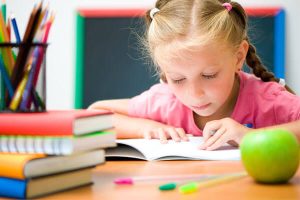
The Language area of the Montessori classroom encourages development of early-literacy. Language skills are acquired in steps. Speaking, learning the phonetic sounds of letters, word building and recognition, writing and reading.
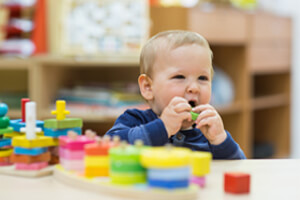
The sensorial materials in the classroom allow the child to refine their sense of touch, taste, smell, sight and sound. The sensorial area builds the child’s concentration for a wider awakening of the senses and perception for distinguishing different qualities and patterns. Many of the exercises in this area are also indirect preparations for later mathematics and language work.
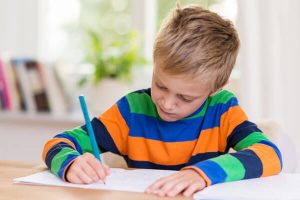
The Math area of the Montessori classroom encompasses the use of concrete materials for the recognition of numbers and the recognition of quantity as well. Mathematics activities are divided into six categories : counting and the decimal system, memory work, concrete abstraction, arithmetic tables and geometry. Children are introduced to more complex mathematical procedures and concepts, as they are individually ready.
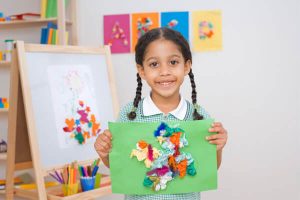
The Culture area of the classroom gives children the ability to learn about a variety of subjects in a hands on way that gets kids excited about learning. It also educates them about their culture and the culture of others and respect. The classroom encompasses a variety of subjects which include: Geography, Zoology, Botany, Science, Art & Music and Languages.
| Practical Life | Sensorial | Mathematics | Language | Culture |
|---|---|---|---|---|
|
Care of Self – Dressing frames |
Visual – Cylinder blocks |
Numbers to 10 – Number rods |
Oral – Identifying sounds |
Geography – Sandpaper globe |
|
Care – Washing tables |
Tactile (Touch) – Touch boards |
Decimal System – Golden beads |
Writing – Sandpaper letters |
Zoology – Living & non-living |
|
Grace – Greeting people |
Olfactory (Smell) – Smelling bottles |
The 4 Operations – Addition |
Reading – Pink scheme (3 letter phonetic words) |
Science – Magnetism |
|
Control of Movement – Rolling mats |
Gustatory (Taste) – Taste bottles |
Memorization – Small number rods |
Part of Speech – Noun and verbs |
Botany – Parts of a plant |
|
Focus – Lacing |
Auditory (Sound) – Sound cylinder |
Fractions | Sentence Analysis (Structure) |
History – Family tree |
| Personal Independence | Stereognostic (Touch with Movement) | Time & Money | Composition | French |
Sample Casa Schedule
| 7:00am – 8:30am | Before School Program | This is a supervised activity period (not Montessori) where children are free to choose from numerous activities set up by the classroom teacher |
| 8:30am – 10:30am | Montessori Work Period & Morning Snack | Children will explore the prepared environment in the 5 areas of the classroom. They will also be given presentations by the teachers at this time. Individual Snack is available to children up until 10:30am |
| 10:30am – 11:00am | French & Circle | Using the Montessori philosophy, children develop the French language through music and visual aids. (French classes will be twice a week) |
| 11:00am – 12:00pm | Outdoor Play | Children will engage in a variety of play that will promote gross and fine motor skills. Children also develop social skills (weather permitting) |
| 12:00pm – 12:30pm | Lunchtime Preparation | Children wash hands and enjoy a healthy lunch |
| 12:30pm | Dismissal | Children enroled in the Morning Half Day Program must be picked up at this time. |
| 12:30pm – 3:00pm | Rest time or Montessori Work Period | Children who do not require a nap are free to find materials from the 5 areas of the classroom they would like to work with. Children waking up after a nap will join the work period. |
| 3:00pm – 3:15pm | Circle Time | Children engage in songs, themes and culture presentations. |
| 3:15pm – 3:45pm | Afternoon Group Snack | Children help prepare the snack table and enjoy a healthy snack as a group |
| 3:45pm – 4:15pm | Specialty Programs | These activities will include art, dance, yoga, martial arts, and physical education. |
| 4:15pm | Dismissal/After School Program Begins | Children not enroled in the After-School Program must be picked up at this time. |
| 4:15pm – 5:15pm | Outdoor Play | Children will engage in a variety of play that will promote gross and fine motor skills. Children also develop social skills (weather permitting) |
| 5:15pm – 6:00pm | Free Play & Evening Snack | Teachers develop a program for children which includes free play, drama, blocks etc. Children will enjoy a variety of activities they can work at as a group to further develop their social skills. A light snack will be provided. |
